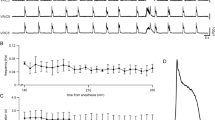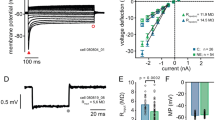Abstract
IN the rat a period of poikilothermy exists for approximately the first seventeen days of life1–2. In this phase of the development action potentials and nerve conduction rate decrease with the lowering of the environmental temperature3. Temperature may change, therefore, the ability of the new-born rat to learn the conditioned leg withdrawal to a vibrotactile stimulus.
This is a preview of subscription content, access via your institution
Access options
Subscribe to this journal
Receive 51 print issues and online access
$199.00 per year
only $3.90 per issue
Buy this article
- Purchase on Springer Link
- Instant access to full article PDF
Prices may be subject to local taxes which are calculated during checkout
Similar content being viewed by others
References
Antoschkina, E. D., Fiziol. Zhur., 26, 1 (1939).
Hill, R. M., Amer. J. Physiol., 149, 650 (1947).
Fairfield, J., Amer. J. Physiol., 155, 355 (1948).
Caldwell, D. F., and Werboff J., Science, 136, 1118 (1962).
Author information
Authors and Affiliations
Rights and permissions
About this article
Cite this article
CALDWELL, D., BRAND, R. & WERBOFF, J. Effect of Environmental Temperature on Conditioning in the New-born Poikilothermic Rat. Nature 195, 1314–1315 (1962). https://doi.org/10.1038/1951314a0
Issue Date:
DOI: https://doi.org/10.1038/1951314a0
Comments
By submitting a comment you agree to abide by our Terms and Community Guidelines. If you find something abusive or that does not comply with our terms or guidelines please flag it as inappropriate.



